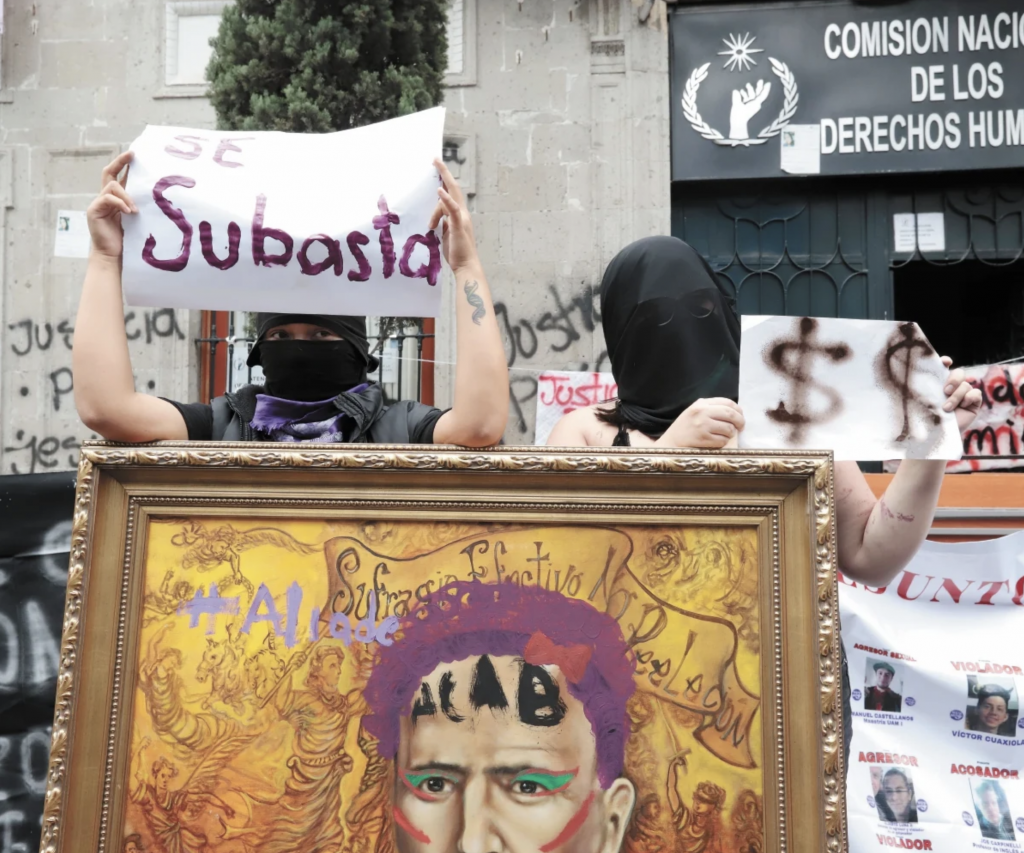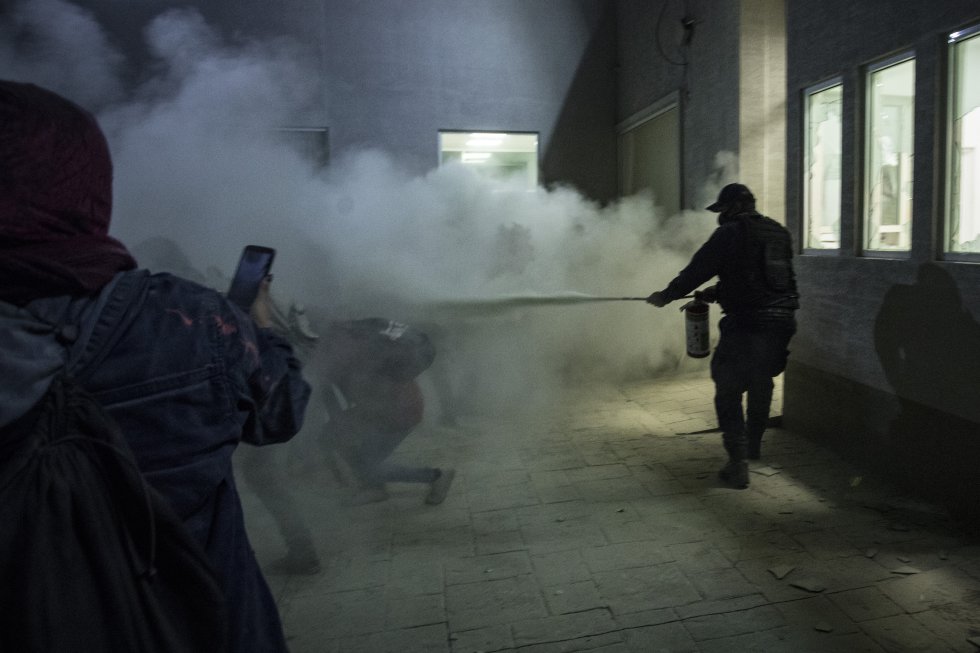09/22/20 (written by vrice)—While rising feminist protests in Mexico during the early months of 2020 were hampered by the coronavirus pandemic, feminist collectives have begun mobilizing again by occupying two nationally-recognized human rights facilities. Mexico possesses the highest number of femicides per capita in Latin America. In the wake of a 60% uptick in domestic violence cases during the pandemic lockdown, Mexican women’s call for justice has taken on increased urgency.
Occupation of the CNDH
Mexico’s National Human Rights Commission (Comisión Nacional de Derechos Humanos, CNDH) is headquartered in Mexico City. Since Thursday, September 3, these headquarters have been occupied by feminist collectives Frente Nacional Ni Una Menos (National Front Not One (Woman) Less) and Aequus, Promoción y Defensa de los Derechos Humanos (Equal, Promotion and Defense of Human Rights). Occupiers demand greater government action to protect against and investigate increasing cases of violence against women. The collectives have turned the headquarters into a shelter for those facing gender-based violence, equipped with medical and legal professionals who have served about 100 women in the first week of September.
Occupation of the CODHEM
On September 10, in solidarity with the CNDH occupation, feminist collectives occupied the headquarters of the Human Rights Comission for the State of Mexico (Comisión de Derechos Humanos del Estado de México, CODHEM) in the municipality of Ecatepec. The collectives said that they were given CODHEM’s permission to peacefully occupy the office and cited motives akin to those of occupiers in the CNDH. Mexican state authorities have been accused of excessive force in their removal of occupiers, during which they detained 11 women, two men, and multiple minors. A few hours after the arrestees’ release on September 11, protestors set fire to and spray painted the CODHEM office to rebuke the police’s violent arrest and removal of occupiers.

Responses could suggest growing solidarity
In response to the CNDH occupation, President Andrés Manuel López Obrador (AMLO) said that he respects the just demand presented by the collectives. Although, AMLO maintained that he condemns violence and occupiers who spray painted walls and painted on a portrait of Mexican revolutionary and former president Francisco I. Madero. The president denounced the latter acts as vandalism. Akin to AMLO’s call for nonviolence, Mexico City Mayor Claudia Sheinbaum emphasized in a press conference that the fight must be peaceful, citing rights to freedom of expression and to protest. The CNDH has also weighed in, maintaining that the organization has no intention to file charges against occupiers and even offering the feminist collectives a different building from which to continue conducting work to combat gender-based violence. The president of the CNDH, Rosario Piedra Ibarra—whose resignation the collectives have requested—affirmed that she is on the side of victims and that the occupiers are not the enemy that needs to be defeated; rather, she called for dialogue. Yesenia Zamudio, one of the Ni Una Menos collective leaders, expressed to El Universal that government officials were less equipped than occupiers to run the CNDH offices.
Meanwhile, the police removal of the CODHEM office occupiers was denounced via Twitter by the State of Mexico’s Governor, Alfredo Del Mazo Maza. The governor also shared that he instructed two officials (including the State of Mexico’s Secretary of Justice and Human Rights, Rodrigo Espeleta) to support the women and safeguard their rights. The State of Mexico’s Attorney General’s Office (Fiscalía General de Justicia del Estado de México, FGJEM) released a statement denying the use of excessive force and stating that individuals had been detained on charges of illegally occupying a public service building. Similar to the CNDH case, the FGJEM maintained that it will not pursue criminal charges against the occupiers. CODHEM expressed that it was on the side of the feminist movement and stands with victims of violence and femicide, parallel with the sentiments of Pierda regarding the CNDH’s occupation. However, hours later when protestors set fire to the office, CODHEM released a tweet condemning these acts as hindering efforts to protect human rights in the State of Mexico. In a press conference on September 11, AMLO asserted that he had not been briefed on the feminist occupiers’ removal. He then requested that the occurrences be investigated and the women be protected from harm.

Significance of occupation locations and the larger pattern of mobilization
Various catalyzing events for the Mexican feminist movement have taken place in Mexico City (Ciudad de México, CDMX), the nation’s capital. Public demonstrations erupted after the rape of a 17-year-old girl by four police men in a patrol car in 2019 and the murders of 25-year-old Ingrid Escamilla and 7-year-old Fatima Cecelia Aldrighett Anton in 2020. The murders of Escamilla and Aldrighett occurred a few weeks before International Women’s Day on March 8, and led to the greatest turnout in such a march in Mexico’s history.
The CNDH headquarters are located in Mexico City. In 2019, Mexico City saw the greatest number of registered sex crimes for any city across Mexico with 6,507—nearly 13% of the national total. This type of crime includes but is not limited to sexual abuse, rape, and varying forms of sexual assault. In the same year, the city also registered the nation’s third highest number of femicides at 71. The CODHEM office, meanwhile, is located in the State of Mexico, which also saw 123 cases of femicide in 2019. These rates make it the state with the second highest cases in all of Mexico. Moreover, in 2019, Ecatepec the municipality where the CODHEM office is located, registered the highest number of cases of intentional injury (5,392), the most cases of extortion (296), and the second most robberies (25,168) in the country. The threatening environments for women in CDMX and Ecatepec may explain parallel demands of CNDH and CODHEM occupiers for the government to more actively address gender-based violence.
The CNDH and CODHEM occupations are not isolated incidents. In fact, over the last two weeks in solidarity with Ni Una Más, feminist collectives have also symbolically occupied local human rights commissions in Aguascalientes, Michoacán, Puebla, Tabasco, and Veracruz. The violent removal of occupiers in Ecatepec is part of a pattern of police behavior in which feminist demonstrations are met with violence. For example, police violently ended a march in Ciudad Juárez, Chihuahua against police brutality last week and arrested 28 women. Furthermore, an August manifestation against sexual assault in León, Guanajuato ended in the arrests of various women, who reported sexual assault against the officers who detained them.
Feminists have grown increasingly aggravated as the threat of gender-based violence continues to rise in Mexico. Data from the Mexican National Public Security System (Sistema Nacional de Seguridad Pública, SNSP) shows 2019 was the most violent year on record for women, and just this August the country registered the highest monthly total for femicides in Mexican history. Statistics from El Sol Mexico estimated that two-thirds of women over 15 years of age in Mexico would be forced to quarantine with a violent partner due to the coronavirus outbreak. Moreover, during the first three weeks after stay at home orders were issued at the end of March, violence against women surged by 30-100%, according to approximates by Mexican authorities. For more resources and statistics, visit Justice in Mexico’s recent blog post examining violence against women during the COVID-19 lockdown here.
Sources
Velasco, Ángeles. “Vandalizan oficinas de la Codhem en Ecatepec.” Excélsior, Sept. 12, 2020.
“CNDH acepta pliego petitorio de feministas.” La Jornada, Sept.10, 2020.
Ortiz, Alex. “Convierten CNDH en albergue.” El Universal, Sept. 7, 2020.
“International Women’s Day and #ADayWithoutUs.” Justice in Mexico, July 2, 2020.
“Domestic Violence in Mexico During COVID-19.” Justice in Mexico, June 16, 2020.
“Women Voice Ire, Fear as Femicides Continue to Rise in Mexico.” Justice in Mexico, March 10, 2020.




